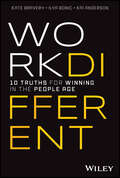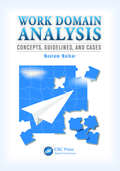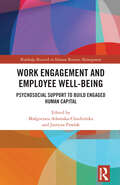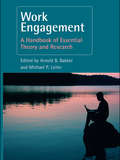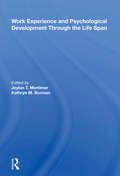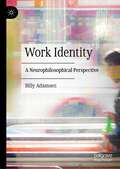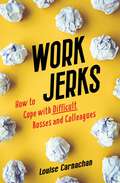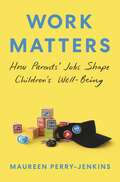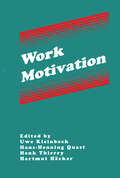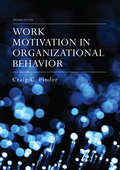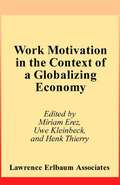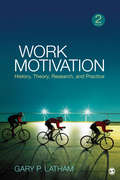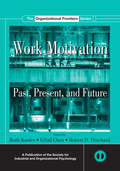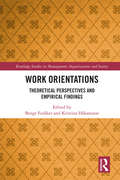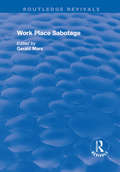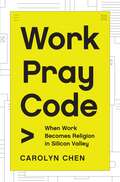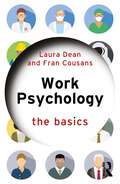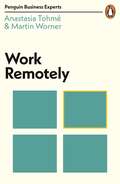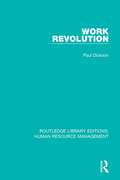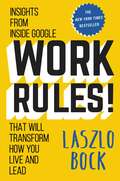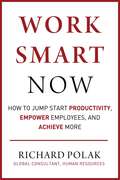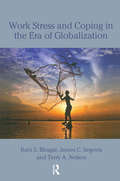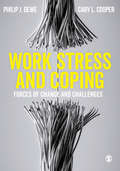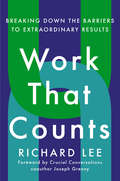- Table View
- List View
Work Different: 10 Truths for Winning in the People Age
by Kate Bravery Ilya Bonic Kai AndersonAn insightful and practical new guide to how sustainable people management works in today’s global economy, with guidance on how to transform the way your organization recruits, hires, upskills, and retains its people In Work Different: 10 Truths for Winning in the People Age, a team of business experts and workforce advisors give an incisive take on the staffing challenges facing leaders in the modern global economy. The book reveals how executives and decision makers can adapt their people agenda for shifts in labor models and employee sentiment. You’ll look ahead to what’s next and learn how to weave sustainability and resilience into your business priorities and make real progress on profits, people, and the planet. You’ll also discover: How generative AI and labor trends will converge to put a premium on agile organizations How to understand what people really want from the organizations they’re employed by: The Lifestyle Contract How you can build a culture that transcends structures and walls, and places skills at the heart of change How stakeholder capitalism and ESG are drawing a new roadmap for success An indispensable resource for executives, managers, board members, human resources professionals, and other business leaders, Work Different: 10 Truths for Winning in the People Age is the no-nonsense, hands-on people management blueprint that you’ve been waiting for.
Work Domain Analysis: Concepts, Guidelines, and Cases
by Neelam NaikarIn complex sociotechnical systems such as military, health care, and nuclear power systems, poor performance or errors resulting from inadequate designs can have catastrophic consequences. Although considered challenging to learn and execute well, work domain analysis can be used as a framework to assist in the design of these systems. Work Domain
Work Engagement and Employee Well-being: Psychosocial Support to Build Engaged Human Capital (Routledge Research in Human Resource Management)
by Małgorzata Adamska-Chudzińska Justyna PawlakWork Engagement and Employee Well-being highlights the vital role of psychosocial support in building and stimulating work engagement. It is a response to the growing phenomenon of weakened employee attachment and engagement instability. The authors underscore the importance of creating a friendly work environment, which accommodates a variety of employee needs and elicits positive emotions, thus fostering the well-being and complete engagement of employees.An in-depth literature review and empirical research conducted using combined qualitative and quantitative methods enabled the authors to present the issue from a wide range of theoretical perspectives. With a model acknowledging the multifaceted nature of work engagement and its association with well-being, the book introduces a selection of psychosocial means to enhance it. The analysis focuses on both systemic measures, that is, promoting a supportive organizational culture and protecting work–life balance, as well as a more individualized approach that not only facilitates the recognition and respect of employee needs but also helps cultivate their development. The book places emphasis on a transformational leadership style and a high level of emotional intelligence among managers, particularly their empathy. Further attention was paid to the various ways to support specific employee groups, such as remote workers and neurodivergent members of the workforce.
Work Engagement: A Handbook of Essential Theory and Research
by Arnold B. BakkerThis book provides the most thorough view available on this new and intriguing dimension of workplace psychology, which is the basis of fulfilling, productive work. The book begins by defining work engagement, which has been described as ‘an opposite to burnout,’ following its development into a more complex concept with far reaching implications for work-life. The chapters discuss the sources of work engagement, emphasizing the importance of leadership, organizational structures, and human resource management as factors that may operate to either enhance or inhibit employee’s experience of work. The book considers the implications of work engagement for both the individual employee and the organization as a whole. To address readers’ practical questions, the book provides in-depth coverage of interventions that can enhance employees’ work engagement and improve management techniques. Based upon the most up-to-date research by the foremost experts in the world, this volume brings together the best knowledge available on work engagement, and will be of great use to academic researchers, upper level students of work and organizational psychology as well as management consultants.
Work Experience And Psychological Development Through The Life Span
by Jeylan T MortimerThroughout the modern era, scholars have shown a continuing concern with the extent to which position in the occupational structure affects psychological development. This book examines whether work experiences and age (often considered as a proxy for stage in the work career) interact such that the effects of occupational conditions on the person
Work Identity: A Neurophilosophical Perspective
by Billy AdamsenAt present, 80% of the employees are no longer engaged in their work and capable of performing, while 44% are experiencing work related stress and getting sick from working. A significant increase in time spent on interpretation at work trying to understand what managers and colleagues are saying has been observed too. This book offers a critical view on vocational inventory tests and the development of the work language and the use of it describing work identity. As well as a neurophilosophical perspective on self and work identity, this book provides a plausible neurophilosophical explanation for the negative impact of losing work identity on our work behavior, well-being, and success. Furthermore, the author introduces the innovative Work Identity Pro, the first work identity test to independently measure work identity. It will be of great interest to scholars and students of human resources management, organisation studies and organisational psychology. It will also be of interest to managers and those with an interest in work identity, behaviour and well-being.
Work Jerks: How to Cope with Difficult Bosses and Colleagues
by Louise CarnachanIf you&’re stressed and unhappy because of problems with a boss or colleague, you pay a price. Not only can your mental and physical health suffer, your nearest and dearest get sick of hearing about it. Going to bed angry and waking up only to dread a new workday is a terrible way to live.Remote work may have lessened the impact of annoying colleagues for a while, but they can still find ways to irritate. If you&’re co-located, the &“mute&” and &“stop video&” buttons don&’t exist to diminish your exasperation. Not all jerks are the same; the person you find to be a nightmare may be perfectly acceptable to others. And, astonishingly, someone else may even think you&’re the jerk!Author Louise Carnachan has the credentials and experience to make her an expert in this area, but more importantly, she&’s been in the trenches herself. With an emphasis on the positive actions you can take while being attentive to your specific situation, Work Jerks provides practical advice on how to deal with a variety of problematic coworkers—whether in-person or remotely—so work can stop being something you dread and start being something you enjoy.
Work Matters: How Parents’ Jobs Shape Children’s Well-Being
by Maureen Perry-JenkinsHow new parents in low-wage jobs juggle the demands of work and childcare, and the easy ways employers can helpLow-wage workers make up the largest group of employed parents in the United States, yet scant attention has been given to their experiences as new mothers and fathers. Work Matters brings the unique stories of these diverse individuals to light. Drawing on years of research and more than fifteen hundred family interviews, Maureen Perry-Jenkins describes how new parents cope with the demands of infant care while holding down low-wage, full-time jobs, and she considers how managing all of these responsibilities has long-term implications for child development. She examines why some parents and children thrive while others struggle, demonstrates how specific job conditions impact parental engagement and child well-being, and discusses common-sense and affordable ways that employers can provide support.In the United States, federal parental leave policy is unfunded. As a result, many new parents, particularly hourly workers, return to their jobs just weeks after the birth because they cannot afford not to. Not surprisingly, workplace policies that offer parents flexibility and leave time are crucial. But Perry-Jenkins shows that the time parents spend at work also matters. Their day-to-day experiences on the job, such as relationships with supervisors and coworkers, job autonomy, and time pressures, have long-term consequences for parents’ mental health, the quality of their parenting, and, ultimately, the health of their children.An overdue look at an important segment of the parenting population, Work Matters proposes ways to reimagine low-wage work to sustain new families and the development of future generations.
Work Motivation (Applied Psychology Series)
by Uwe Kleinbeck Henk Thierry Hans-Henning Quast Hartmut HA unique compendium of international investigations into motivation and performance, this book offers chapters by industrial and organizational psychologists from the United States, Europe, Australia, and Japan as they share their theories, concepts, empirical evidence, and practical evidence regarding the subject. The volume focuses on three distinct themes: * the relationship between motivation and performance * practical examples of building and strengthening the motivating potential with particular attention paid to productivity and the health of the employees * the development of work motivation over time and the change of the relative importance of central variables Work Motivation provides an exceptional blend of modern theoretical approaches, technologically sound techniques for solving practical problems, and empirical results to prove theoretical and technical validities.
Work Motivation in Organizational Behavior: Theory, Issues And Applications (Scott, Foresman Series In Organizational Behavior And Human Resources Ser.)
by Craig C. PinderThis second edition of the best-selling textbook on Work Motivation in Organizational Behavior provides an update of the critical analysis of the scientific literature on this topic, and provides a highly integrated treatment of leading theories, including their historical roots and progression over the years. A heavy emphasis is placed on the notion that behavior in the workplace is determined by a mix of factors, many of which are not treated in texts on work motivation (such as frustration and violence, power, love, and sex). Examples from current and recent media events are numerous, and intended to illustrate concepts and issues related to work motivation, emotion, attitudes, and behavior.
Work Motivation in the Context of A Globalizing Economy
by Miriam Erez, Uwe Kleinbeck and Henk ThierryWork Motivation in the Context of a Globalizing Economy evolved from a work motivation conference held in Israel, attended by a group of internationally renowned scholars. These scholars were given the charge of creating a vision of motivation research for the 21st century. Coming from different parts of the world, the scholars represent a wide range of perspectives from the very micro focus on the individual level of motivation, through the meso level of groups and organizations, and up to the macro level of culture. The authors provide an entry to the book by summarizing several mega-trends manifest across all of the chapters and identifying several emerging trends that are left for future research.
Work Motivation: History, Theory, Research, and Practice
by Gary P. LathamThis book provides a unique behavioral science framework for motivating employees in organizational settings. Drawing upon his experiences as a staff psychologist and consultant, Gary Latham writes in a "mentor voice" that is highly personal and rich in examples. The book includes anecdotes about the major thought leaders in the field of motivation, together with behind-the-scenes accounts of research and the researchers. It offers a chronological review of the field, and a taxonomy for the study and practice of motivation. Controversies of theoretical and practical significance such as the importance of money, the relationship between job satisfaction and job performance, and the distinction between intrinsic and extrinsic motivation are discussed.
Work Motivation: Past, Present and Future (Siop Organizational Frontiers Ser.)
by Robert D. Pritchard Ruth Kanfer Gilad ChenThis edited volume in SIOP's Organizational Frontiers Series presents the current thinking and research on the important area of motivation.Work Motivation is a central issue in Industrial organizational psychology, human resource management and organizational behavior. In this volume the editors and authors show that motivation must be seen as a m
Work Orientations: Theoretical Perspectives and Empirical Findings (Routledge Studies in Management, Organizations and Society)
by Bengt Furåker Kristina HåkanssonWork orientations and work attitudes have to do with the productive capacities in society. Insofar as individuals are positively oriented towards contributing their labour, we can expect a great amount of work to be done and to be carried out efficiently, carefully and responsibly. These subjective factors are thus very vital in modern working life. Work Orientations: Theoretical Perspectives and Empirical Findings offers up-to-date research on people’s commitment to work and employment and job satisfaction in economically advanced countries. It will also analyse changes that have taken place in these respects over the last decades. Among the key issues in Work Orientations are questions about whether patterns of work centrality and employment commitment tend to remain stable or have changed across time in various countries. Moreover, we assume that the circumstances under which people participate in the social division of labour colour their subjective relationships to their jobs and to employment in general. A major aim of the book is to explore the impact of factors such as occupation, education, age and gender on work orientations and work attitudes. Work Orientations will be invaluable for researchers and scholars in the fields or organizational studies, the sociology of work, employee engagement and related disciplines.
Work Place Sabotage (Routledge Revivals)
by Gerald MarsThis title was first published in 2001. The examples cited in this study of sabotage in the working environment range from sophisticated tricks played in Western factories to natural reactions to inferior or unhealthy working practices in, for example, Malaysia and India. The book contains articles from various contributors which cover numerous topics within the subject including crime and punishment in the factory, employee and organizational sabotage, and management techniques to prevent sabotage.
Work Pray Code: When Work Becomes Religion in Silicon Valley
by Carolyn ChenHow tech giants are reshaping spirituality to serve their religion of peak productivitySilicon Valley is known for its lavish perks, intense work culture, and spiritual gurus. Work Pray Code explores how tech companies are bringing religion into the workplace in ways that are replacing traditional places of worship, blurring the line between work and religion and transforming the very nature of spiritual experience in modern life.Over the past forty years, highly skilled workers have been devoting more time and energy to their jobs than ever before. They are also leaving churches, synagogues, and temples in droves—but they have not abandoned religion. Carolyn Chen spent more than five years in Silicon Valley, conducting a wealth of in-depth interviews and gaining unprecedented access to the best and brightest of the tech world. The result is a penetrating account of how work now satisfies workers’ needs for belonging, identity, purpose, and transcendence that religion once met. Chen argues that tech firms are offering spiritual care such as Buddhist-inspired mindfulness practices to make their employees more productive, but that our religious traditions, communities, and public sphere are paying the price.We all want our jobs to be meaningful and fulfilling. Work Pray Code reveals what can happen when work becomes religion, and when the workplace becomes the institution that shapes our souls.
Work Psychology: The Basics (The Basics)
by Laura Dean Fran CousansWork Psychology: The Basics provides an accessible, jargon-free introduction to the fundamental principles of work and occupational psychology. Covering key theories and models in this dynamic area, it offers a solid understanding of both academic theory and practical applications. The book follows the structure of the British Psychological Society curriculum for Masters courses, exploring psychological assessment at work, learning, training and development; wellbeing at work, work design, organisational change and development, and leadership, engagement and motivation. These core topics are supplemented by deep dives into the development of the discipline, research and practice in the field, and suggestions for the future of work psychology. Giving a detailed look into the world of work, it answers questions such as: Can we accurately select people for jobs? How can work positively and negatively affect mental and physical health? How can we motivate people in the workplace? What makes a good leader? It also explores issues around types of research and what effective research looks like in this area. Supported by a helpful guide on the routes to chartership in the UK and working in the area, as well as a glossary of key terms and suggestions for further reading, this is the ideal introductory text for students. It will also interest those looking to understand the subject more generally and complete training in the area.
Work Remotely (Penguin Business Experts Series)
by Martin Worner Anastasia TohméRemote working makes us happier, more productive and more profitable, but it can bring its own set of challenges. How do we manage our work-life balance; communicate and collaborate effectively as teams; and ensure our technology is efficient?In Work Remotely, Penguin Business Experts Anastasia Tohmé and Martin Worner explain everything you need to know:- Set your own targets and monitor productivity- Establish boundaries between working hours and free time- Manage effective communication and decision-making at a distanceIncluding case studies from the companies around the world who are innovating and revolutionizing the way we work, Work Remotely shares useful advice and practical tips to ensure you get the most out of working away from the office environment.
Work Revolution (Routledge Library Editions: Human Resource Management)
by Paul DicksonIn this book, first published in 1975, the author critically examines the organisation of work, the systems of control, and the patterns of authority in British establishments. By bringing together detailed descriptions of alternative forms of work organisation and management from Norway, Sweden, Denmark and the USA, Paul Dickson provokes considerable thought as to the extent to which these models could be developed and applied in the UK. This title will be of interest to students of business studies and human resource management.
Work Rules!: Insights from Inside Google That Will Transform How You Live and Lead
by Laszlo BockNEW YORK TIMES BESTSELLER WALL STREET JOURNAL BESTSELLER From the visionary head of Google's innovative People Operations--a groundbreaking inquiry into the philosophy of work and a blueprint for attracting the most spectacular talent to your business and ensuring the best and brightest succeed. "We spend more time working than doing anything else in life. It's not right that the experience of work should be so demotivating and dehumanizing. " So says Laszlo Bock, head of People Operations at the company that transformed how the world interacts with knowledge. This insight is the heart of WORK RULES!, a compelling and surprisingly playful manifesto with the potential to change how we work and live. Drawing on the latest research in behavioral economics and with a profound grasp of human psychology, Bock also provides teaching examples from a range of industries--including companies that are household names but hideous places to work, and little-known companies that achieve spectacular results by valuing and listening to their employees. Bock takes us inside one of history's most explosively successful businesses to reveal why Google is consistently rated one of the best places to work in the world, distilling 15 years of intensive worker R&D into delightfully counterintuitive principles that are easy to put into action, whether you're a team of one or a team of thousands. Cleaving the knot of conventional management, some lessons from WORK RULES! include: Take away managers' power over employees Learn from your best employees--and your worst Only hire people who are smarter than you are, no matter how long it takes to find them Pay unfairly (it's more fair!) Don't trust your gut: use data to predict and shape the future Default to open: be transparent, and welcome feedback If you're comfortable with the amount of freedom you've given your employees, you haven't gone far enough WORK RULES! shows how to strike a balance between creativity and structure, leading to success you can measure in quality of life as well as market share. Read it to build a better company from within rather than from above; read it to reawaken your joy in what you do.
Work Smart Now: How to Jump Start Productivity, Empower Employees, and Achieve More
by Richard PolakFrom one of the top HR specialists in the world comes this much-needed guide to help people maximize productivity and increase revenue. Whether it&’s in corporate America or in our own living rooms, people are wasting time. From the minute we wake up and check our Facebook page or emails—before we even crawl out of bed—to late at night when we stay up longer than we should, watching our favorite show. There&’s a precise moment that falls between working enough hours to be productive and working too many hours, yielding a diminishing marginal return. The difference between the person able to master this and most Americans that fail miserably at it is quality of life! If one continues to work past this moment, a negative return will ensue, and that negative return produces guilt. It lowers the amount of time for recreational activities and spending time with family. We&’ve siloed productivity to our work life, however; the impact on our personal life is often loss. An alarming 39% of workers in high-tech companies believe they are depressed, as reported by PC Magazine in December 2018. 72% of people who have daily stress and anxiety say it interferes with their lives—anxiety and stress alone have reduced productivity by 56%. More than 80% of people have experienced some form of anxiety, stress, or depression in the workplace. People are spending more time at work than at home or with their loved ones; or, if they are at home, they are working. They are always &“on.&” As a result of this disparity, people are not fully living their lives. And the &“work-life balance&” marketed by some HR consulting firms and employers simply does not work. It&’s all work and no life! Studies have also proven that when people are unhappy in their personal lives or careers, their productivity goes down and everything and everyone around them suffers. This causes a domino effect, which trickles into every area of their lives. Previous generations used to say, &“Work harder,&” but we&’ve now learned we must &“work smarter.&” Polak has practiced and tested his methods in hundreds of opportunities and has been paid millions by the largest corporations in the world to share these tools. He feels that every individual and business should have these tools, and will share them with us here.
Work Stress and Coping in the Era of Globalization
by Rabi S. Bhagat Terry Nelson James SegovisThis book examines the phenomena of how individuals experience work stress and coping in both developed and developing countries in the world. Rabi Bhagat, known for his cross-cultural scholarship in this area, and his co authors, help us recognize the causes and consequences of work stress. They present a systematic, comprehensive review of this topic with plenty of practical insights and case studies examining work stress and coping in the era of globalization. Researchers, practitioners and students in the field of industrial organizational psychology, organizational behavior, and human resources management will find this book of interest.
Work Stress and Coping: Forces of Change and Challenges
by Cary L. Cooper Philip J. DeweWork Stress and Coping the authors provide an historical account of workplace stress, taking a broad approach by integrating the macro forces impacting the micro, and highlighting what the research in the field tells us about the changing nature of work so that individuals and organisations can create more liveable working environments. With an emphasis on the growing influence of globalization, the book explores the forces of change within contemporary societies and assesses how they have fundamentally changed the nature of work and the direction of research into stress and coping. Capturing the history, context, critique and transformation of theory into practice, the authors offer an insight into how managers and businesses have failed, the effects this has had on how work is experienced, the evolution and relevance of existing theories and suggest alternative methods and future directions. Suitable reading for students of HRM, Organisational Behaviour and Occupational Psychology.
Work Stress and Coping: Forces of Change and Challenges
by Dr Cary P. Cooper Dr Philip J. DeweLecturers/Instructors - Request a Free digital inspection copy HERE In Work Stress and Coping the authors provide an historical account of workplace stress, taking a broad approach by integrating the macro forces impacting the micro, and highlighting what the research in the field tells us about the changing nature of work so that individuals and organisations can create more liveable working environments. With an emphasis on the growing influence of globalization, the book explores the forces of change within contemporary societies and assesses how they have fundamentally changed the nature of work and the direction of research into stress and coping. Capturing the history, context, critique and transformation of theory into practice, the authors offer an insight into how managers and businesses have failed, the effects this has had on how work is experienced, the evolution and relevance of existing theories and suggest alternative methods and future directions. Suitable reading for students of HRM, Organisational Behaviour and Occupational Psychology.
Work That Counts: Breaking Down the Barriers to Extraordinary Results
by Richard LeeOne of Silicon Valley's top leadership trainers distills his proven framework that has empowered teams at the world's most innovative companies--from Google and Facebook to Cisco Systems and biotech giant Genentech/Roche--to do the best work of their lives.Richard Lee has worked with thousands of ambitious leaders and their teams, and has found that they all share the same frustration. Whether it's because of communication breakdowns or increasing complexity, people at every level of an organization feel like their results fall short of their expectations--even though they are putting in a lot of effort.Management gurus will tell you that you need to overhaul your entire organization in order to maximize its full potential, but that is simply not true: You only to give your people the tools to succeed inside it.The framework outlined in Work That Counts draws on examples from teams he has worked with at the world's most cutting edge, disruptive companies, and provides practical solutions to the problems that hold people back in nearly every organization. Among other critical skills, you'll learn: • How a team leader can hold team members accountable without micromanaging--and what team members need to do concurrently to earn the team leader's trust. • How to get support for your objectives from other teams, even when they don't report to you or your division or your business unit. • How to partner with others, within your team and on other teams, to achieve the results you want.Work That Counts is a commonsense yet groundbreaking guide, filled with assessments and real-world examples that will empower organizations to make the most of their people and become more than the sum of their parts.
